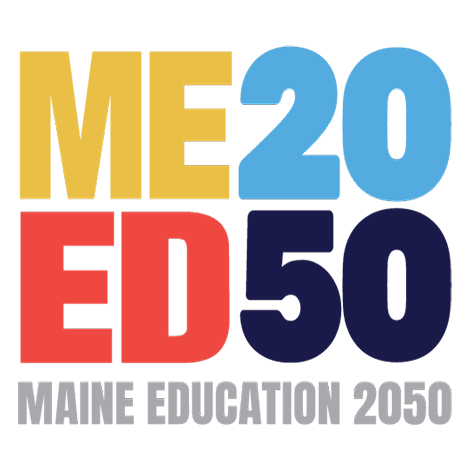What skills and capacities do our youth need from their education to thrive in the Maine of 2050?
The Maine ED 2050 project engages students, parents, educators, community members, and industry leaders to imagine the Maine of the future — what is coming toward us now and what we value and want to strive for. It asks Mainers to consider what it means to thrive personally, civically, and economically in their community now and how that might change in the future. It also asks Mainers to consider what those visions might mean for schooling in particular.
What skills and capacities are needed?
How are those skills and capacities best developed?
Where and with whom are those skills and capacities best developed?
The project is iterative in that these questions will never be “answered.” The discussions will evolve as community needs shift, technology advances, the environment changes, and our society progresses. Maine ED 2050 is a place to meet each other to discuss, grapple, expand our understanding, imagine, and ultimately contribute to the ongoing conversation about school’s role and value in our society. Maine ED 2050 brings the people together for meaningful, small group, guided discussions on these topics and gathers their voices into white papers and reports as well as provides an online platform for their stories to be heard by all.
Why is this Important?
Education is how our young people learn to sustain and evolve our communities toward desired futures, and it necessarily needs to evolve itself in order to provide newer generations with the knowledge and ways of thinking and being appropriate to their task. School is only one of the ways we become educated, but it is an important one. Family, our legal system, arts and culture, social media, and even the natural environment all provide education. But our public schools are a place where all students come to learn to create the future, our future, together. In a democratic society, the importance of “together” can’t be overstated. To educate ourselves together in common schools requires sharing a common vision for what it means to flourish, what that will look like and require in the future of our communities, and what young people need to know, be, and be able to do to facilitate that future flourishing. We, the people, together, can inform the work of local school boards as well as state education agencies in maintaining and evolving our systems of schooling. Without a meaningful voice, we can feel disconnected from public schools as well as disillusioned about their work. For public schooling to remain relevant and trustworthy, its evolution needs to be both purposeful and transparent and also guided by a diversity of meaningfully engaged Maine people.
Maine Education 2050 provides an on-ramp to participation for everyone and lifts their voices to be heard by the public and decision-makers at all levels, building trust and hope through engagement and increasing common understanding and the social good will necessary for successful democratic governance.
How can I get involved?
75-minute, small group discussions are held virtually or in-person. They are generally organized by school or county for youth, parents and community, and educators and across counties for statewide industry and non-profit sector groups. Choose your group below and click to let us know you are interested in participating. We’ll be in touch to give you more information.
Here are some other ways to get involved:
- Invite your leadership team, community group, neighbors, or colleagues to participate in a conversation or conversations.
- Integrate Maine ED 2050 into your district’s strategic planning process. We support schools through the whole process and provide you with meaningful, actionable, data.
- Join us as a collaborating organization to help bring diverse voices to the table and share the learnings with the broader public.
- Support the project as an individual or organizational sponsor. Be in touch for specifics.
For more information or to join the initiative, contact Jennifer Chace at jennifer.chace@maine.edu.







